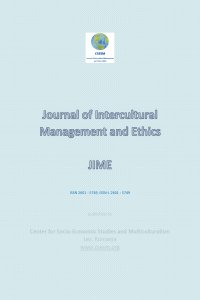The Ethics of Representing the Other: From Backstage to Frontstage Racism?
The Ethics of Representing the Other: From Backstage to Frontstage Racism?
Author(s): Amna Ben AmaraSubject(s): Business Economy / Management, Government/Political systems, Migration Studies, Accounting - Business Administration, Asylum, Refugees, Migration as Policy-fields
Published by: Center for Socio-Economic Studies and Multiculturalism
Keywords: CDA; Conceptual Metaphor; political discourse; undocumented immigrants; Caravan; imagined community; political correctness;
Summary/Abstract: Metaphors are central discursive strategies that can be employed in the Othering process and identity construction. As such, although Trump’s rhetoric has already provoked a cottage industry of books, the role of his ideologically motivated metaphors in detecting his perception of American national identity has remained largely undiscovered. Therefore, the aim of this research is to investigate the highly racialized dimension of Trump’s metaphors and their role in marginalizing undocumented immigrants from the nation’s popular imagination. This study met its research objectives through using the cognitive approach developed by Lakoff and Johnson (1980). In the pursuit of such aim, the research achieves the following findings: it illustrates that Trump often conceptualizes undocumented immigrants as liquid, threatening animals, and un-welcomed guests that should be combated. Trump's rhetorical strategies are highly effective not only in dehumanizing undocumented immigrants and proving their incompatibility with his vison of Americanism but also in fanning the flames of fear and anxiety and communicating a sense of axiological urgency to act against them. Most importantly, the dysphemistic aura of the then president's metaphors justifies the dramatic shift in acceptable appeals to race and ethnicity among many Americans and, consequently, casts doubt on the idea of a post-racial America. It demonstrates his association of patriotism with plain hostility towards the out-group and his endeavor to erect impermeable and well-defined boundaries that filter out these groups out of the popular national imagination.
Journal: Journal of Intercultural Management and Ethics
- Issue Year: 5/2022
- Issue No: 3
- Page Range: 37-54
- Page Count: 18
- Language: English

